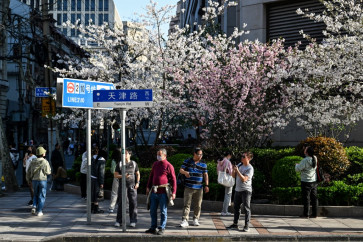Bantul farmers to go organic slowly, use limited chemicals
Farmers in Karanglo subdistrict, Polanharjo district, Klaten regency, Central Java, have decided to gradually switch to a sustainable farming system by starting to plant organic rice this planting season, subdistrict head Yudi Kusnandar has said
Change Size

F
armers in Karanglo subdistrict, Polanharjo district, Klaten regency, Central Java, have decided to gradually switch to a sustainable farming system by starting to plant organic rice this planting season, subdistrict head Yudi Kusnandar has said.
Speaking at the launch of the Karanglo agricultural laboratory over the weekend, Yudi said his administration had pledged to turn the subdistrict into an organic rice production center by 2011.
"A pilot project has shown that organic farming is not just environmentally friendly but also economically promising."
Yudi said seven hectares of the subdistrict's total rice fields of 85 hectares were now being organically farmed, an area that would increase gradually so that by 2011 all fields in Karanglo would be farmed as such.
He added that the launch of the laboratory and the start of the organic farming at the end of last month also marked the beginning of a long-term agricultural-based socio-eco-business program in the subdistrict.
"We have a dream of again making the agricultural sector a reliable source of income, which, together with other productive economic activities here, would be capable of creating more job opportunities for the people," Yudi said.
The 118-hectare Karanglo has a population of 2,450, or 900 families, most of which were farmers.
The laboratory, which was established with the help of local NGO Yayasan Indonesia Sejahtera (YIS) and drinking water producer Danone Aqua Indonesia, Yudi said, had a number of facilities that would help the subdistrict realize its goal.
The facilities included an organic fertilizer production center with the capacity to produce 2 tons of fertilizer per day and a field school for farmers of Karanglo and the surrounding regions.
"When everything goes as scheduled, we probably will be the first subdistrict in the region to buy all the organic waste produced by its people to be further processed into organic fertilizer," he said, adding two more fertilizer factories were to be built to fulfill the subdistrict's own need for the commodity.
Sumedi, 45, from the Karanglo farmers' group association (Gapoktan) said he was interested in joining the subdistrict's first 20 farmers to start the organic farming in the first 7-hectare field because the method promised him a higher income.
With non-organic farming, he said, he would need to pay Rp 800,000 in production costs for a pathok of rice field, while with organic methods he would only need Rp 450,000. A pathok equals approximately 1,600 square meters.
Although in terms of yield, organic farming would provide a smaller harvest, a much better price for organic rice products would help him earn more through organic farming, he said.
The process to change from non-organic to organic farming in Karanglo, according to Joko Sunyoto, another farmer, was conducted gradually in order to avoid drastic decreases in the harvest.
During the first stage, he said, chemical fertilizers would still be used but would be limited to only 40 kilograms for a pathok of field from previously more than 100 kilograms.
The amount would be reduced gradually until zero kilograms of chemical fertilizer were used, meaning it would be fully organic.
"It will take five planting seasons before we can fully run a completely organic farming system here."
He added that once organic farming was already in full operation, the yields could be as big as that of non-organic farming.









